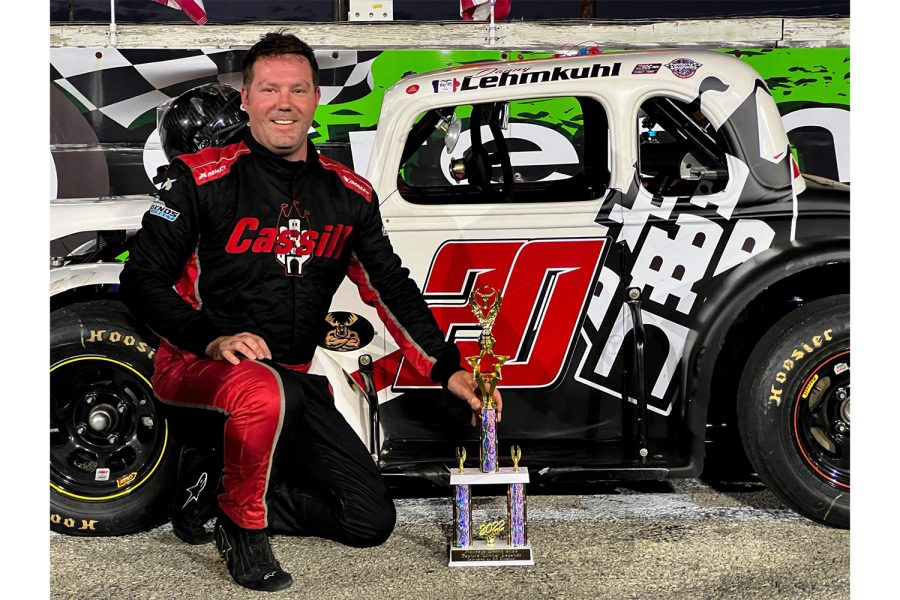Local racing driver Danny Lehmkuhl weighs in on finances of motorsports
In a sport that continues to get more expensive, the 33-year-old leans on the support of sponsorships and his family.
October 18, 2022
Danny Lehmkuhl participates in Legend Car races in Iowa and Wisconsin every summer weekend.
But Lehmkuhl isn’t racing for large cash prizes or a promise of a lucrative career in the future. He’s doing it for the love of racing.
With a hobby that can cost thousands of dollars per year, Lehmkuhl said sponsorships play a huge role in allowing him and other local drivers to continue. Buying a car, refueling, repairing damage, replacing and adding parts, storage, transport, and general tuning all cost money.
Lehmkuhl, 33, said most of the companies that sponsor Legend Cars are doing it because of connections.
“If I see somebody sponsoring another car, I try to go support him if I can,” Lehmkuhl said. “But really, in our world, they’re not sponsoring a NASCAR team. They’re not expecting these local Legend drivers to turn around their marketing program, or drive a bunch of business to the front door.”
Lehmkuhl started racing Legend Cars part-time in 2015. He shared a car with a friend, Griffin McGrath — the son of Mike McGrath who owns Legends Direct, a Legend Car supplier for Iowa and Wisconsin.
Lehmkuhl, Griffin McGrath, and others took turns racing the car at Hawkeye Downs, a racetrack in Cedar Rapids, for a few years before Lehmkuhl bought his own Legend Car for around $15,000 in 2019.
Lehmkuhl said he stores his car at Legends Direct — a perk of knowing the McGrath family. For transport, the driver uses a motorcycle trailer, which is much less expensive than a full car trailer.
Legend Cars are on the cheaper end of the race car spectrum both in terms of retail price and maintenance. The cars resemble 1930s family coups, and the small stature makes them easy to store and transport. INEX, the sanctioning body for Legend Cars, has also implemented regulations to make participation more affordable.
The sanctioning body does not allow drivers to use race fuel and requires the use of a hard tire compound, leading to less tire wear.
The cars run on 1,200 cubic centimeter Yamaha motorcycle engines. Lehmkuhl said he hasn’t had to replace the engine once since buying his car in 2019. But even with cost-cutting measures from INEX and sponsorship money, Lehmkuhl said it’s still a major financial commitment for him and the other drivers.
“Almost everybody at Hawkeye Downs is really just paying for themselves,” Lehmkuhl said. “And then their sponsors are helping with that … I would say that if a driver can get over half of their yearly expenses covered by sponsors, they’d be doing better than most.”
Lehmkuhl said expenses have added up even more since he started regularly traveling to Wisconsin in 2019 — each trip costs him about $150 in diesel.
On top of driving, Lehmkuhl also works a day job at R/B Sales in Hiawatha that allows him to fund his racing career.
“It’s definitely a hobby where you’re losing money,” Lehmkuhl said. “It’s an expense. There’s no way to do it and make money unless you start with a lot of money or have really, really good sponsors.”
There are additional costs in variables and uncertainty in racing, including possibilities of tire punctures, engine and gear failures, and crashing. Lehmkuhl said crashes cost between $200-$500 to fix on average, but can get up to $5,000.
“Maybe a sponsor says, ‘Hey, how much do you need? We’ll cover half,’” Lehmkuhl said.
The payout at Hawkeye Downs for the driver who wins a Legend Car race is $225. At Jefferson Speedway in Cambridge, Wisconsin, where Lehmkuhl often races on Saturdays, the payout is $250. In severe circumstances, Lehmkuhl said, drivers will have to sit out for a couple weeks and wait to come back until they get the money to make repairs.
Lehmkuhl said his most expensive crash cost was $1,200, when two drivers wrecked in front of him and left him with nowhere to go. The crash broke his left front suspension. With crashes and damage common in racing, Lehmkuhl said most drivers do their own repairs with welding equipment they trained themselves to use.
In a typical season, Lehmkuhl participates in 25 to 30 races, though some drivers participate in upwards of 50. Lehmkuhl said he went through all of 2022 without crashing, though his season was cut short by the six-week premature birth of his son, Brooks, in June.
Lehmkuhl said he’s unsure whether his racing schedule will become less dense now that he’s a father. But Lehmkuhl said it’s much easier to maintain his current schedule with a Legend Car than it would be in other classes.
“With an asphalt Legend Car, there’s way less maintenance in my opinion,” Lehmkuhl said. “That’s why it’s an attractive class. You have a very difficult car to drive. It’s very fun to drive and it’s less than half the maintenance of a dirt modified.”
Besides driving, he usually spends at least a few hours every week making sure the car is ready for the track by tightening bolts and doing general upkeep.
“Everybody’s told me from growing up that races are not won on the racetrack; they’re won in the shop,” Lehmkuhl said. “And the fastest cars at the racetrack are the guys that spend their time in the shop and make sure every detail is perfect.”
Lehmkuhl said the support from his family has been huge, with around 20 relatives coming to watch him from all across Iowa. The support has been key, Lehmkuhl said, because he wouldn’t be racing without his wife’s approval.
“If she didn’t support it, it wouldn’t happen,” Lehmkuhl said. “Because even the time on top of the money is more than most hobbies.”



